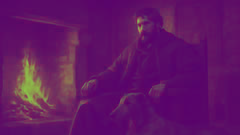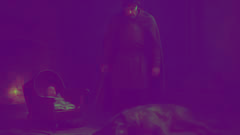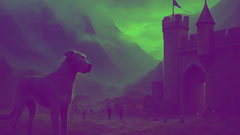Introduction
In the rugged heart of northwestern Wales, where the mountains rise sharply and the valley mists curl around ancient stone cottages, legend weaves its quiet threads through every shadowed wood and silent glen. There, in the storied land near Snowdonia, the River Glaslyn carves its path through emerald meadows and mossy boulders, and the breeze often carries tales older than memory. Among these tales, none is whispered with such sorrowful reverence as the story of Gelert—the loyal hound of Prince Llywelyn. This legend clings to the stones and streams of Beddgelert, a place whose very name recalls the faithful dog’s tragic fate. In those days, when the forests teemed with wolves and the threat of raiders pressed on all sides, Llywelyn the Great ruled Gwynedd from his stone-walled stronghold. A prince beloved by his people, he was a man of war and wisdom, but even he was not immune to the storms that gather in a man’s heart. Gelert was his constant companion—a hound of noble bearing, swift as the wind, with a thick grey coat and eyes keen as the mountain eagle. Gelert was more than a guardian; he was a friend, a silent comfort in the prince’s loneliest hours. The bond between man and dog was forged through countless hunts and quiet evenings beside the hearth, where the flames flickered like old memories. Yet, as every villager and wandering bard would come to know, fate can be as cruel as it is capricious. One fateful day, when the prince’s castle bustled with preparations for a hunt and Llywelyn’s infant son slept in his cradle, a series of tragic events would unravel the fabric of trust between man and beast. The mountains watched in silence as a simple misunderstanding blossomed into lifelong regret. Through this retelling, we’ll follow the footsteps of Llywelyn and Gelert, moving through dew-soaked forests, torchlit halls, and grief-shadowed chambers—a journey into the heart of loyalty and loss that would echo for centuries throughout the Welsh valleys.
Chapter I: The Bond Forged in Shadow and Sunlight
From his earliest days, Gelert was unlike any hound that had roamed the forests of Wales. Bred from a line of noble hunting dogs, he was gifted to Prince Llywelyn as a pup, his coat silver-grey and paws comically oversized. The boy and the dog grew side by side—prince and companion, learner and protector—chasing after each other through the castle’s courtyards and the nearby fields where bluebells bent with the breeze. It was not long before Gelert’s courage made him a legend in his own right. He saved shepherds’ flocks from hungry wolves, guided lost travelers back to the safety of firelit inns, and stood beside Llywelyn during parliaments and feasts. The villagers of Beddgelert spoke of the hound’s uncanny intelligence and steadfast loyalty. To Llywelyn, Gelert became more than a hound; he was a confidant, often found lying with his muzzle across the prince’s boots during council meetings or sleeping beside the cradle of Llywelyn’s infant son, Gruffydd. The castle itself seemed to embrace Gelert, its stones warmed by his presence, its halls echoing with the soft rhythm of his steps. In the great hall, under the high-arched beams blackened by centuries of hearth smoke, Llywelyn would speak with Gelert late into the night. Though the hound could not answer in words, his eyes reflected a deep understanding—a trust unbroken by the world’s storms. One cold autumn morning, as the first frost dusted the fields, Llywelyn prepared for a royal hunt. The castle bustled with excitement: banners unfurled, horns gleamed in the pale sun, and horses stamped eagerly in the courtyards. The prince’s wife, Elen, entrusted their infant son to the care of the household nurse, who laid the sleeping child in a cradle by the great hearth. Gelert, ever watchful, settled at the foot of the cradle, his ears attuned to every sigh and flutter from the child. Llywelyn, dressed in hunting leathers and braced for a day’s chase, knelt beside his hound. “Guard him well,” he whispered, pressing his brow to Gelert’s broad head. The hound’s tail thumped softly on the flagstones in silent promise. The hunt thundered out of the castle gates with a flurry of hooves and baying horns. Through dew-soaked forests and up craggy hillsides they rode, chasing the wily stag deep into the shadowed heart of the woods. But the day would not end in triumph. As dusk thickened and the hunt returned, the wind carried with it an uneasy silence—a sense that something within the castle walls had shifted, as if an old oak had groaned beneath an unseen weight.

Chapter II: The Tragedy in the Cradle
As Llywelyn entered the castle courtyard at twilight, a strange stillness met him. The usual chorus of stable boys and kitchen maids was absent; torches burned low, and the air seemed to shiver with dread. Llywelyn’s heart hammered as he strode inside. The nurse rushed to him, her face as pale as birch bark. “My lord—the child! I—I left but for a moment—” she stammered. Llywelyn’s footsteps echoed through the empty halls as he dashed toward the nursery. There he stopped short. The cradle was overturned, the swaddling blankets scattered on the floor, smeared with blood. Standing beside the chaos was Gelert, his muzzle dark and stained, eyes shining with a strange mix of anxiety and hope as he wagged his tail and whimpered softly. Llywelyn’s mind reeled. The room reeked of violence, yet his son was nowhere to be seen. Grief surged in him—a black wave that threatened to drag him under. He looked at Gelert, saw the blood, and in that fevered, desperate moment, his world narrowed to a single, terrible certainty. Drawing his sword, Llywelyn’s hands shook as he called Gelert’s name. The hound, trusting as ever, came forward, tail wagging, seeking reassurance. Llywelyn raised his blade, blinded by grief and rage, and struck. Gelert crumpled with a soft whine, collapsing at his master’s feet. Silence fell, broken only by Llywelyn’s sobs. But then—a faint cry pierced the gloom. Llywelyn threw aside the cradle and blankets, searching with frantic hands. There, beneath the heavy cradle, he found his son—frightened but unharmed. Nearby lay the twisted, lifeless body of a great wolf, its jaws still bared in death. Understanding crashed over Llywelyn. In his haste, he had slain the one creature that had truly protected his child. Gelert’s blood mingled with that of the wolf on the stone floor, but only one belonged to a loyal friend.

Chapter III: Remorse Echoes Through the Valley
For a long moment, Llywelyn could not move. He knelt beside Gelert’s still form, hands shaking as he reached to cradle the hound’s great head. Tears coursed down the prince’s face, falling onto Gelert’s fur. The castle was silent but for his quiet weeping and the soft, confused cries of his son. As dawn broke over Beddgelert, word of the tragedy spread through the valley like wildfire. Villagers gathered in hushed knots outside the castle walls, sorrow and disbelief on every face. Llywelyn carried Gelert in his arms to a quiet glade by the river, where wildflowers grew thick among ancient stones. With his own hands, he dug a grave for his faithful friend. The prince placed Gelert gently into the earth, then laid his sword beside him—a mark of respect for the hound’s bravery. He marked the spot with a cairn of stones, his grief carving deeper lines into his weathered face. For days after, Llywelyn wandered the hills in silence. The once-boisterous castle was subdued, its laughter stilled by mourning. Night after night, Llywelyn found himself by Gelert’s grave, seeking forgiveness in whispered prayers. He spoke to the hound as if he could still hear, telling him of his son’s first steps, of Elen’s gentle smile, of the stags that roamed the distant woods. The valley itself seemed to mourn—the river running slower, the birds singing in minor keys. Llywelyn’s sorrow became a living thing, haunting the halls and lingering in the morning fog. He ordered that no hunts be held for a year, and he commanded that Gelert’s grave remain tended and honored. The prince’s remorse was a lesson that echoed through every hearthside story, a warning to all who acted in haste or allowed fear to cloud judgment. In time, Llywelyn’s son grew strong and wise, and the people of Gwynedd forgave their prince. Yet Llywelyn never forgave himself. He would often be seen at Gelert’s cairn, his hand resting on the cold stones as if searching for absolution. The hound’s sacrifice became legend—told and retold until it was woven into the very soul of the land.

Conclusion
The legend of Gelert endures in the mists of Beddgelert, whispered by every stream and echoed by every wind that stirs the ancient hills. Visitors to the village still find the cairn where Gelert is said to rest, flowers growing thick among the stones—a place of quiet remembrance and reflection. The story is one of love and trust, but above all, of the tragic consequences that can spring from fear and haste. For generations, parents have shared Gelert’s tale with their children, urging them to listen, to question, to wait for truth before leaping to judgment. Though Llywelyn’s grief could never bring back his friend, his sorrow carved a lesson into the heart of Wales—one that teaches that loyalty is precious, trust is fragile, and regret, once born, lingers as long as memory itself. In this way, Gelert lives on—not just in stone and story, but in every act of patience and understanding that grows from the wisdom of loss.













